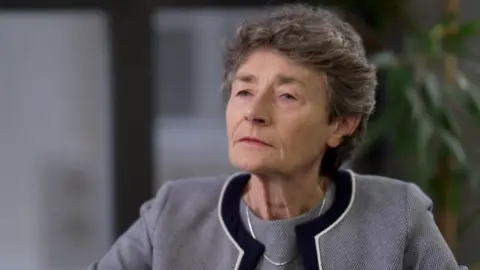‘Young disabled adults fighting for basic rights’
15 October 2024
Polly March

The chair of a college for young adults with disabilities has urged the government to “fix” the social care system to avoid devastating consequences.
Lynette Barrett, CEO of National Star College in Cheltenham, said “worst case scenario is young people die” after they leave education and enter adult social care.
She was speaking as a new House of Lords report claims young disabled people are being “written off”.
The government says it is committed to “tackling significant challenges facing social care to ensure everyone is able to live a dignified life”.
Mrs Barrett said many young adults had “no clear transition plan” for where they would live and what they would do when they left full-time education, like National Star.
She said many ended up in inappropriate living situations and in the worst-case scenarios, some saw declining health and died.

“It really brings into question the human rights of somebody with a disability to make the same choices as any other young person would at that age,” she said.
“We shouldn’t be in a situation where they are having to fight so hard for the basic things in life that they need in order to be able to live a fulfilled life,” she added.
The new House of Lords report examined the barriers young disabled people face at every level of education and as they try to access the world of work.
BBC News spent five years following Elliot Caswell, as he studied at National Star College in Gloucestershire and prepared to enter the world of work and live independently.
He struggled to find appropriate accommodation where he could live independently and was unable to find suitable work.

The Select Committee report shows the challenges Elliot faced during his transition from education to employment and adult care services are not unique.
Many young adults with additional needs find the wraparound support and care drops off abruptly as they turn 25, meaning the life skills and independence they have worked so hard to achieve stall, affecting their motivation and confidence.
Philippa Spearing from near Oakhill, Somerset, said the fight to find her son Angus suitable accommodation after leaving National Star has been “horrific.”
Angus was born with global developmental delay and is non-verbal. He also suffers from severe epilepsy and can stop breathing following a seizure.
She said: “Each year he was at (National Star) college Somerset Council wouldn’t tell me he had a place for the next year until the very last week of the summer term – it was incredibly stressful.
“Then when we were looking for residential care for him we were sent to wholly inappropriate places.
“Angus needs 24-hour care because of his seizures, but we were offered a flat in a complex of 30 where I was told a carer might not get to him for half an hour.
“Another place had mould all up the walls and two elderly residents.”
Ms Spearing is unable to have Angus at home as she broke her back several years ago and cannot manage the manual handling but says he is now very happy at a home in Bristol.
However, she said the process has been “cruel” and detrimental to her own health.
‘Preparation is priority’
A spokeswoman for Somerset Council said: “Preparation for adulthood is a priority for the council.
“Many young people are receiving exemplary support from our local colleges and a range of other providers, however, we are aware that too many young people need something different which is not available within the county or any surrounding area.
“We are working with partners in the local area to review the provision that is available post-16 with the aim of improving the offer for all young people.”

Chair of the Public Services Committee, Baroness Morris of Yardley, said the report provides a “blueprint” for the government to implement its commitment to getting more young disabled people into work.
“It highlights how to put in place appropriate support for young disabled people and employers so that the system is both cohesive and effective.
“We’ve asked the Government to provide us with regular updates on its progress with implementing our recommendations, and we look forward to receiving its response to this report,” she said.
A government spokesperson said: “Every young people should be able to access the support they need to thrive in life, and this government is committed to tackling the significant challenges facing social care to ensure everyone is able to fulfil their potential, and live an independent, dignified life.
“As part of this, we will build a National Care Service based on consistent national standards and delivered locally.”